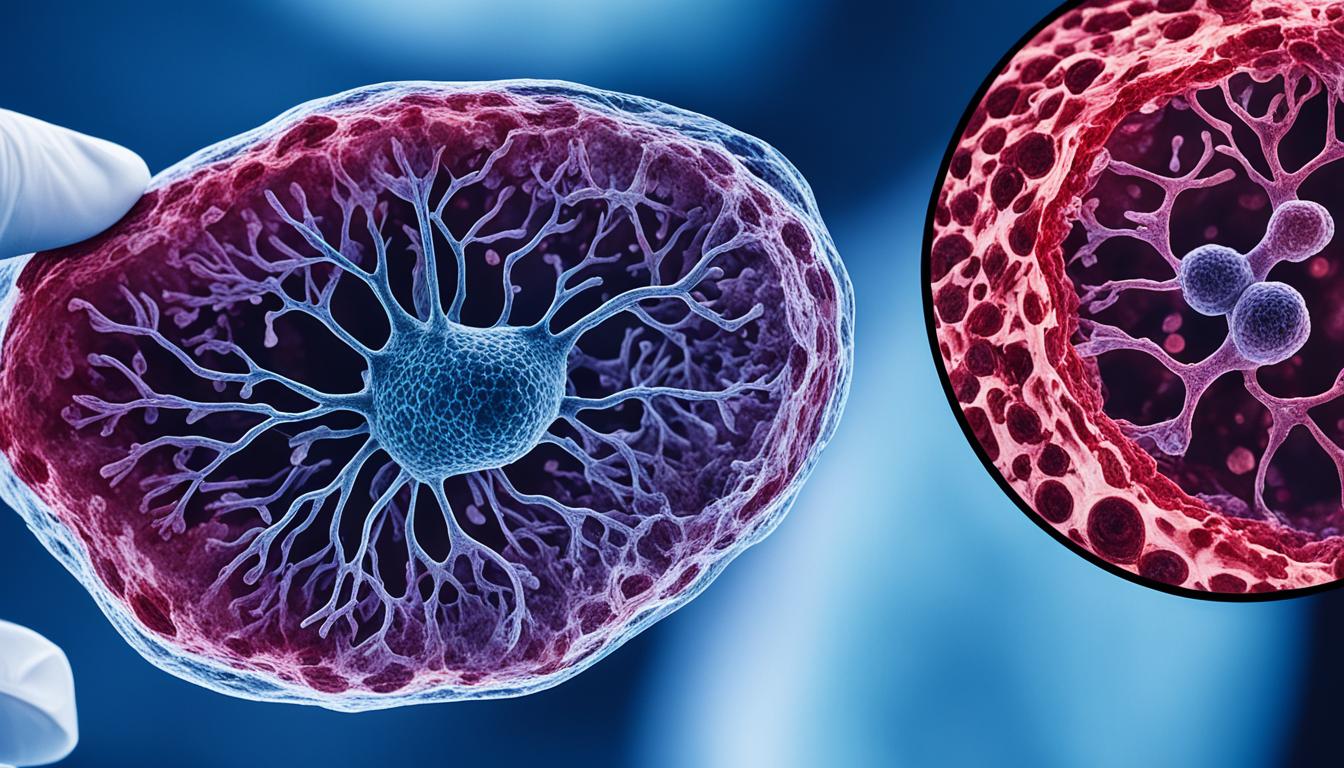Stage 4 prostate cancer is the most advanced type. It has spread beyond the prostate to other areas like bones and organs. This stage is often called advanced or metastatic prostate cancer. It has a lower chance of being cured and lower survival rates. Symptoms may include bone pain, trouble with peeing, feeling tired, losing weight, and breathing problems.
The reasons for prostate cancer are not clear. But, it is likely due to genes, hormones, and the environment. To spot stage 4, doctors use imaging tests, biopsies, and blood tests. Treatments can be surgery, radiation, hormone therapy, chemo, or immunotherapy. In the past years, using stem cells to treat prostate cancer has shown promise. This method targets the root cause of cancer, aiming to stop it from growing back after treatment.
Key Takeaways:
- Stage 4 prostate cancer spreads to other parts of the body.
- Its symptoms can be bone pain, trouble peeing, feeling tired, losing weight, and breathing issues.
- The causes are complex, involving genes, hormones, and the environment.
- Diagnosis involves imaging tests, biopsies, and blood checks.
- Treatments can involve surgery, radiation, hormone therapy, chemo, and immunotherapy.
- Stem cell therapy offers new hope by targeting and eliminating cancer cells.
Although stage 4 prostate cancer is very serious, new treatments like stem cell therapy are bringing hope. This method targets cancer at its source, with the goal of better survival, slower tumor growth, and a higher quality of life. More study is needed to understand fully how well stem cell therapy works. But, it’s important for patients to talk to their doctors about this as a possibility in their treatment. This can be part of a complete plan to fight the disease.
Stem Cell Therapy for Stage 4 Prostate Cancer
Stem cell therapy shows promise against stage 4 prostate cancer. It targets and destroys cancer stem cells. These cells can lead to tumor growth, spread, and resist treatments. Stem cell therapy uses cells from the patient or a donated source. It aims to regrow healthy prostate tissue and kill cancer cells.
There are several ways to give stem cell therapy for stage 4 prostate cancer. This includes putting cells into the bloodstream, the tumor itself, or the prostate directly. These methods are meant to get the cells to the right place. The goal is to kill cancer and help the prostate grow back.
First studies of this treatment have been positive. They show it can help with living longer, slowing down the disease, and improving life quality. By focusing on cancer stem cells, this method gives hope to those with advanced prostate cancer.
Still, more research is needed. We need to know how well it works over time and how safe it is. Research is ongoing to learn more about using stem cells against stage 4 prostate cancer.
The Potential of Stem Cell Therapy for Stage 4 Prostate Cancer
Stem cell therapy could change how we treat stage 4 prostate cancer. It targets the cancer stem cells that are hard to treat. This method offers hope for better outcomes and life quality.
Adding stem cell therapy to treatment plans gives patients more choices. But, patients should talk openly with their doctors. They need to discuss if this option is good for them. The stage of cancer, overall health, and personal goals all matter.
To understand better how stem cell therapy fits in treatment plans, talk to your doctor. Keep updated on the latest research in this area.
Conclusion
Stage 4 prostate cancer is tough but treatable. Many treatments like surgery and chemo can help. They vary in success but offer hope.
Stem cell therapy stands out, aiming to fight cancer from its roots. Early signs are hopeful. But, more studies are essential to know its long-term benefits.
For patients, closely working with doctors is key. They should look into all options. This helps make choices fitting their needs.
With the latest treatments and support from medical teams, beating stage 4 prostate cancer is more possible. Quality of life can improve too.

